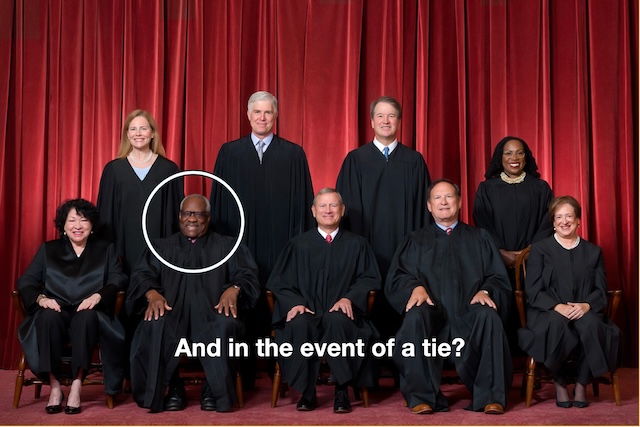Missing the Point – Checks and Balances and the Disqualification of Justice Clarence Thomas
One of the earliest and most enduring lessons I learned in public school was that our federal government has three branches. The legislative branch makes the laws. The executive branch manages the country based on those laws and the judicial branch makes sure those laws are consistent with the Constitution of the United States of America. We are nothing if not a nation of laws.
These branches, so I was taught, were restrained from exercising excessive influence and power over the operations of our government by virtue of what are called “checks and balances.” I know it sounds like a home economics segment in household finance, but it’s not. Congress was to be kept under control by the power of the Presidential veto and Supreme Court rulings. The President and his/her administration by Congress and the Supreme Court. And the Supreme Court… And the Supreme Court…
“What’s wrong?”
Sorry, I almost forgot. The Constitution does, in fact, provide a limited capability for Congress to determine the jurisdiction of the Supreme Court. Specifically, from Section 2 of Article III…
In all Cases affecting Ambassadors, other public Ministers and Consuls, and those in which a State shall be Party, the Supreme Court shall have original Jurisdiction. In all the other Cases before mentioned, the Supreme Court shall have appellate Jurisdiction, both as to Law and Fact, with such Exceptions, and under such Regulations as the Congress shall make.
That’s it. The italics and bolding are my doing. So, Congress can determine the cases that the Supreme and other federal courts can consider.
“Hm.”
Yeah, I agree. Not much detail, is there? I mean, what happens if a Republican majority in Congress decides that the Supreme Court cannot consider the matter of, let’s say, Presidential immunity? Is that all there is to it? I must be missing something.
Has Congress ever limited what the Supreme Court can consider? As a matter of fact, it has. Many times, although not recently. You’d think the Republicans would be all over this option to save their innocent leader from spending the rest of his life in jail.
“So why haven’t the Republicans just ordered the Supreme Court to stand down?”
Good question, but I have no idea. Possibly because they would need to have full command over both houses and their Republican causes.
And so, subject to the practicalities of federal politics, Congress has limited control over the Supreme Court. That said, the Supreme Court continues to act as if the fabled system of “checks and balances” are for the other two branches of government and subject to the Supreme Court’s supervision.
Forget about checks and balances. That’s idealized, wishful thinking for public school textbooks. In the real world, the Supreme Court is the self-regulating, otherwise unchecked branch of government. Their selection is a politically charged process at a long arm’s length from public scrutiny and control. Once confirmed, their appointments are for life. Absent some grievous misstep, the individual Justices are untouchable.
Recently, there have been a good many ethical issues, public reaction to which has forced the Court to adopt a long overdue “Code of Conduct.” I’ll leave it to you to read this Code for its specific language and to draw your conclusions as to its usefulness.
Suffice it to say that section “B. Disqualification” under “Canon 3: A Justice Should Perform the Duties of Office Fairly, Impartially, and Diligently” of this code requires that Justice Clarence Thomas recuse himself from consideration of Donald Trump’s claim of immunity and other matters involving the former President. Why is that? His problem is the well-documented, high profile, financially lucrative support of Trump’s various lies by Justice Thomas’ spouse, Virginia “Ginni” Thomas.
The Code’s only stated exception to recusal by Justice Thomas has to do with what is known as the “rule of necessity.” According to my layman’s understanding of this rule, a Judge/Justice need not recuse him or herself if, perhaps because the conflict of interest is so common among the Justices, the case at hand could not be considered without his or her participation. They might, for example, all need to recuse themselves. The rule doesn’t apply in this instance, given that only Justice Thomas is married to his wife, but he’s refusing to recuse himself anyway. Presumably, he’s just come to the self-serving conclusion… Because, what the heck, who’s going to stop him? …that his wife’s commitment to Donald Trump has not and cannot be construed by the public to have affected his judgment.
In fairness, it should be noted that Justice Thomas did, indeed, recuse himself from a minor bit of Court business having to do with the January 6 attack on the Capitol. The case had to do with the right of John Eastman, a Trump attorney, to protect certain emails that, not incidentally, had already been obtained by Congress. Thomas’ recusal, which occurred prior to the release of the new Code of Conduct, had little if any impact on the matter at hand. Earlier recusals by Thomas were related to activities by his son, but never his wife who had earned hundreds of thousands of dollars opposing Obamacare years ago.
Keep in mind that it’s not just the fact of a conflict of interest that counts. It can be just the appearance of such a conflict that makes recusal appropriate. Again, from Section “B. Disqualification” of the Code of Conduct…
A Justice should disqualify himself or herself in a proceeding in which the Justice’s impartiality might reasonably be questioned, that is, where an unbiased and reasonable person who is aware of all relevant circumstances would doubt that the Justice could fairly discharge his or her duties.
What’s the real reason Justice Thomas isn’t recusing himself from consideration of Trump’s claim of immunity? In my opinion, of course, it’s that his recusal could result in a conservative/liberal tie on this particular matter. In the event of a tie, the rulings of the lower courts stand and Donald Trump is toast, subject to the results of legal process like the rest of us.
What are the penalties should Justice Thomas fail to recuse himself? There are none, certainly not in the Code of Conduct which is nothing more than a set of guidelines without the force of law or consequences for misbehavior.
So much for the concept of “checks and balances” when it comes to the very top of the judiciary branch of our government.

Les Cohen is a long-term Marylander, having grown up in Annapolis. Professionally, he writes and edits materials for business and political clients from his base of operations in Columbia, Maryland. He has a Ph.D. in Urban and Regional Economics. Leave a comment or feel free to send him an email to [email protected].

